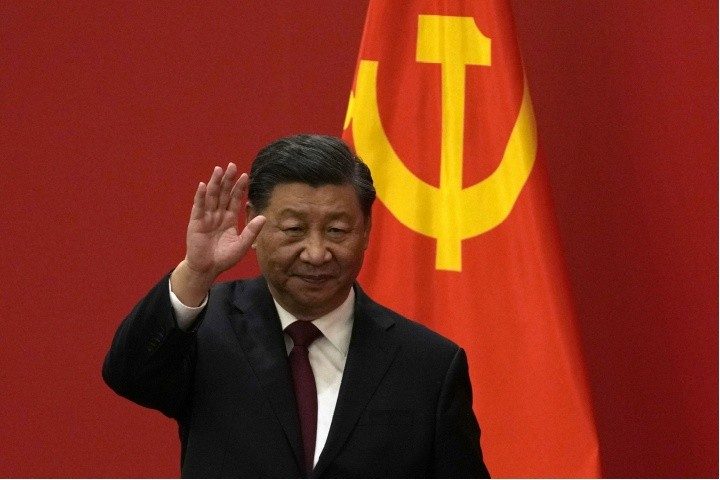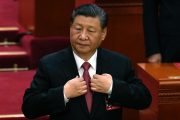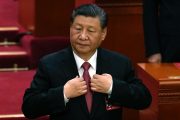
Chinese President Xi Jinping, his ruling Politburo, and senior government officials convened with top officials at a major annual economic policy conference to chart out a recovery plan for China’s embattled economy as the communist regime eases its zero-Covid policy.
The closed-door annual Central Economic Work Conference was held December 15-16, according to three sources with direct knowledge of the matter.
An official statement after the conference released Friday by the Xinhua news agency stated that China will work on policy amendments and reinforce policy coordination to support the economy in 2023.
This agenda-setting meeting of the country’s top leaders, who convened to plan out the course of China’s economy in 2023, has been monitored closely by investors amid hopes that Beijing would step up support for the second-largest economy in the world.
“We should continue to implement proactive fiscal policies and prudent monetary policies, strengthen macro policy regulation, strengthen coordination and cooperation of various policies, and form a joint force to promote high quality development,” Xinhua quoted the statement as saying.
China should better coordinate epidemic prevention and control, and economic and social development, it added.
Xinhua also said that China’s economy faces comparatively huge pressure from contracting demand, supply shocks, and dwindling expectations.
The country will push to increase domestic demand, prioritize consumption recovery, and attain major economic targets in 2023, according to the statement, without providing more details as to what these targets are.
Top leaders reinforced their stances that China will adhere to its principle of “homes are for living in, not for speculation,” and pledged to support robust housing demand, the statement said.
Economists estimate that China’s growth has slowed down to about three percent this year, far below the official target of around 5.5 percent. This is considered some of the worst economic performance in almost 50 years.
International Monetary Fund chief Kristalina Georgieva predicted that a growth downgrade for China is “very likely” after a recent spate of Covid-19 infections, news agency AFP reported on Tuesday.
The World Health Organisation (WHO) warned of “very tough” times ahead.
“It’s always very difficult for any country coming out of a situation where you’ve had very, very tight controls,” WHO spokesman Margaret Harris told a press briefing in Geneva, adding that China faced a “very tough and difficult time.”
WHO Director-General Tedros Adhanom Ghebreyesus said in May that China’s previous Covid-19 regime was unsustainable.
Recently, China’s National Health Commission (NHC) said it would stop reporting new asymptomatic Covid-19 infections, as many no longer undergo testing, making it challenging to precisely tally the total count.
“Many asymptomatic people are no longer participating in nucleic acid testing, so it is impossible to accurately grasp the actual number of asymptomatic infected people,” it said in a statement on Wednesday.
Xi’s zero-Covid policy contained draconian measures that provoked widespread protests nationwide in November. He admitted the resentment within China amid his stringent measures, CNN reported, based on a statement from an EU official.
Xi told visiting European Council President Charles Michel in Beijing that the protesters were “mainly students” who were frustrated after three years of Covid.
“Xi also said Omicron is less deadly than Delta, which makes the Chinese government feel more open to further relaxing Covid restrictions,” the EU official said.
The official spoke on the condition of anonymity, citing European professional norms.
However, the official could not confirm if Xi uttered the word “protest” in Mandarin, or say what wording precisely was used by the Chinese leader to characterize the recent unrest over the restrictions.
Rare demonstrations erupted across China in November to protest against China’s draconian Covid-19 control measures. The latest series of protests is the first massive nationwide movement since Xi assumed power in 2012. Under Xi’s aegis, the Communist Party has tightened its grip on all aspects of life, launched a massive repression on dissent, and built a high-tech surveillance state.
Foreign officials have noted Beijing’s shift on Covid-19 restrictions. U.S. Deputy Secretary of State Wendy Sherman said Friday that the widespread protests in China “had an effect” in loosening some Covid rules.
Speaking at an event at American University, Sherman noted that the protests had subsided, and said part of the reason why is because “they actually had an effect,” citing the example of China permitting people to quarantine at home.
“At the same time, I’m not naïve, and the Chinese used their security forces to put the protests down,” she added.
“So this is not an all good news story,” Sherman said. “But protests do matter.”
In light of the relaxation of China’s zero-Covid measures, the communist state has been trying to persuade older citizens that its latest Covid-19 “vaccines” are “easy to take and effective.”
State-run media depicted a woman at a clinic in Tianjin who said “there was no discomfort” with a new inhaled “vaccine,” while a woman in Shanghai remarked that getting her booster was “a bit like drinking milk tea.” A man in Wenzhou reassured the hesitant, “it doesn’t hurt at all, and it’s a little sweet.”
Authorities have recently approved six domestic “vaccines,” with two of them not requiring a needle, instead administered through a nasal spray or inhaled through a nebulizer.
Doctors quoted in state media have welcomed the inhaled “vaccines,” saying they are effective, safe, and suitable for older populations, without elaborating with more data to prove their claims.



